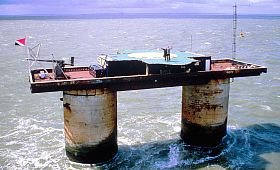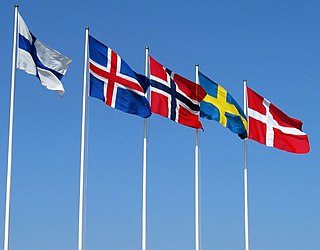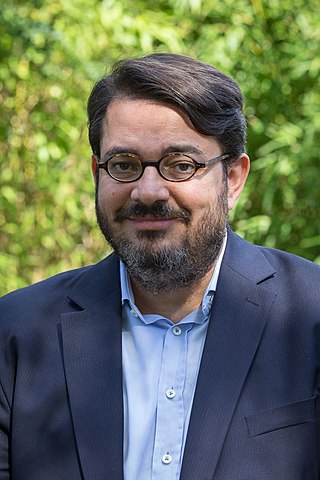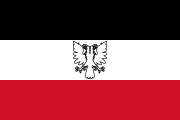Related Research Articles

A micronation is a political entity whose representatives claim that they belong to an independent nation or sovereign state, but which lacks legal recognition by any sovereign state. Micronations are classified separately from de facto states and quasi-states; they are also not considered to be autonomous or self-governing as they lack the legal basis in international law for their existence. The activities of micronations are almost always trivial enough to be ignored rather than disputed by the established nations whose territory they claim—referred to in micronationalism as macronations. Several micronations have issued coins, flags, postage stamps, passports, medals and other state-related items, some as a source of revenue. Motivations for the creation of micronations include theoretical experimentation, political protest, artistic expression, personal entertainment and the conduct of criminal activity. The study of micronationalism is known as micropatriology or micropatrology.

A Nordic cross flag is a flag bearing the design of the Nordic or Scandinavian cross, a cross symbol in a rectangular field, with the centre of the cross shifted towards the hoist.

The Aerican Empire, conventionally referred to in short form as Aerica, is a social organization and self-proclaimed micronation, founded in May 1987. Its name stems from the term "American Empire". In 2000 The New York Times described its website as "one of the more imaginative" micronation sites.

Molossia, officially the Republic of Molossia, is a micronation claiming sovereignty over 11.3 acres of land near Dayton, Nevada. The micronation has not received recognition from any of the member states of the United Nations. It was founded by Kevin Baugh. He continues to pay property taxes on the land to Storey County, the recognized local government, although he calls it "foreign aid". He has stated "We all want to think we have our own country, but you know the United States is a lot bigger".

Micronations are ephemeral, self-proclaimed entities that claim to be independent sovereign states, but which are not acknowledged as such by any recognised sovereign state, or by any supranational organisation. The constant reiteration of the flag as a symbol of a something that exists by the entity that it symbolizes confirms the validity of the flag as an officially sanctioned and/or definitive symbol of an entity; therefore, there has been a close association between vexillology/vexillogic imagination in creating visual symbols that appear to legitimize micronational claims.

Micronations: The Lonely Planet Guide to Home-Made Nations is an Australian gazetteer about micronations, published in September 2006 by Lonely Planet. It was written by John Ryan, George Dunford and Simon Sellars. Self-described as a humorous guidebook and written in a light-hearted tone, the book's profile of micronations offers information on their flags, leaders, currencies, maps and other facts. It was re-subtitled Guide to Self-Proclaimed Nations in later publications.

Akhzivland is a micronation between Nahariya and the Lebanese border on the Israeli west coast, founded by Eli Avivi in 1971. The micronation is promoted by the Israel Ministry of Tourism.

The Grand Duchy of Flandrensis is a micronation with claims over some territories of Antarctica, which was founded in 2008 by the Belgian Niels Vermeersch. Flandrensis is not recognised by any country or government, nor is it their intention to get diplomatic recognition. Since 2021 the micronation is registered in Belgium as the environmental non-profit organization “vzw Groothertogdom Flandrensis”.
MicroCon is a biennial summit or conference of micronationalists held in every other year since April 11, 2015. The event was created by Kevin Baugh of the Republic of Molossia, and every summit since has been hosted by a different micronation. MicroCon is a significant event in the micronational community, serving as a venue for exchanging ideas between micronationalists. The event has also been compared to the micronational equivalent of a session of the United Nations General Assembly. The largest edition, MicroCon 2019 in Hamilton, Ontario, Canada, had 113 attendees from 43 micronations. MicroCon 2023 was the first edition to consist of two separate events: an American summit in Joliet, Illinois, and a European summit in Ypres, Belgium.

Travis McHenry is an American-born micronationalist and occultist.

Westarctica, officially the Grand Duchy of Westarctica and formerly the Protectorate of Westarctica, is a micronation in Antarctica, founded in 2001 by Travis McHenry, who styles himself as Grand Duke Travis. It claims a region of West Antarctica that has not been claimed by any nation state, comprising most of Marie Byrd Land. This wedge is located between the Ross Dependency claimed by New Zealand, and the Chilean Antarctic Territory, between 90 degrees and 150 degrees west longitude and south of the 60th parallel. The region includes 1,600,000 square kilometres (620,000 sq mi) of land, making it the largest territory not claimed by any recognized nation. Westarctica claims over 2,000 citizens, but none of them reside within the claimed territory, which has no permanent settlements or research stations.

The flag of Columbus is the official municipal flag of Columbus, Ohio. Its current design is a yellow, white, red vertical triband with the city seal on a blue field. Officially, the flag was adopted in 1929, although it is unknown if the flag was ever flown when it was first adopted.

The Antarctic Micronational Union (AMU) is an intermicronational organization that aims to regulate micronational claims in Antarctica. The purpose of the AMU is to protect the claims of its members against other claimants.

MicroWiki is a free online encyclopedia about micronations launched in 2005. It has since become the principal way in which Internet users document micronational matters, as most do not meet Wikipedia's notability requirements. It is maintained by volunteers using the same MediaWiki software as Wikipedia. MicroWiki describes itself as "the largest encyclopedia about micronations".

Micronations and the Search for Sovereignty is a 2021 book by Australian constitutional law specialists Harry Hobbs and George Williams about micronations and their legal status. Written from an academic perspective, it is one of few works on micronational movements and the earliest-published book to focus largely on the legal aspect of micronations. The book concerns the definition of statehood, the place of micronations within international law, people's motivations for declaring them, the micronational community and the ways by which such entities mimic sovereign states. In 2022 Hobbs and Williams published a book for a broader audience, How to Rule Your Own Country: The Weird and Wonderful World of Micronations.

How to Rule Your Own Country: The Weird and Wonderful World of Micronations is a 2022 book by Australian lawyers and legal academics Harry Hobbs and George Williams about micronationalism—exploring several micronations and their motivations for declaring independence. The book gives an overview on the topic of micronationalism and explores numerous micronations, extant and defunct, as well as their motivations for declaring sovereignty. An overarching theme is the disproportionate number of micronations located within Australia. How to Rule Your Own Country is a follow-up to Hobbs' and Williams' more academic 2021 work Micronations and the Search for Sovereignty.
The League of Secessionist States is a dormant, Internet-based intermicronational organisation that exists "to promote intermicronational communication and partnership, and serves to act as a supramicronational, impartial Body where such a need for one may exist." Initially established on 26 November 1980 by Robert B. Madison, self-proclaimed king of the Kingdom of Talossa, it was reestablished in April 1996 during a "micronational boom" on the Internet. It was the principal intermicronational organisation on the Internet between 1997 and at least 2000.

Although the academic study of micronations—known as micropatriology—is limited, there have nevertheless been a number of published works on the subject. The following is a list documenting these written works. This list does not contain works wherein micronationalism is the secondary theme, such as reference works which contain or make references to micronations and books about individual micronations.

Kevin Baugh is an American-born micronationalist who is the founder and President of the Republic of Molossia, a self-proclaimed micronation that is not formally recognised by any world government.
References
- ↑ John Ryan, George Dunford & Simon Sellars (2006). Micronations. Lonely Planet. pp. 90–93. ISBN 1-74104-730-7.
- ↑ "Molossia and Vikesland? Leaders of (fake) nations gather in L.A.", CBS News, 10 April 2015; access date 11 February 2020.
- ↑ "MicroCon 2015", Republic of Molossia; access date 11 February 2020.
- ↑ "What do you mean you haven't heard of Slabovia, Westarctica and Vikesland?", The Journal.ie, 11 April 2015; access date 11 February 2020.
- ↑ Neuman, Scott (10 April 2015). "Tiny Territories Mingle At MicroCon; Passports Optional". The Two-Way. NPR. Retrieved 11 February 2020.
- ↑ "King Christopher orders national flag change.", Kingdom of Vikesland, 30 January 2015; access date 10 February 2020.

